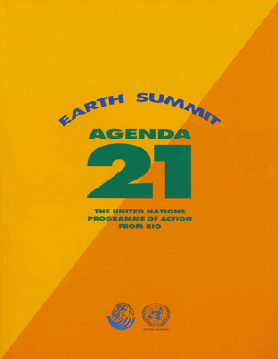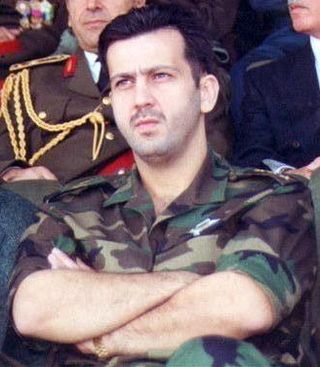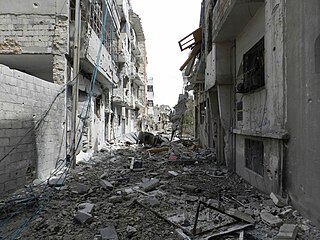
Agenda 21 is a non-binding action plan of the United Nations with regard to sustainable development. It is a product of the Earth Summit held in Rio de Janeiro, Brazil, in 1992. It is an action agenda for the UN, other multilateral organizations, and individual governments around the world that can be executed at local, national, and global levels. One major objective of the Agenda 21 initiative is that every local government should draw its own local Agenda 21. Its aim initially was to achieve global sustainable development by 2000, with the "21" in Agenda 21 referring to the original target of the 21st century.

Major General Maher Hafez al-Assad is a Syrian former military officer who served as commander of the Syrian Army's elite 4th Armoured Division, which, together with Syria's Military Intelligence, formed the core of the Ba'athist regime's security forces until its collapse in 2024. He is the younger brother of former Syrian president Bashar al-Assad, and also was a member of the Central Committee of the Syrian Ba'ath Party.

The Human Rights Foundation (HRF) is a non-profit organization that focuses on promoting and protecting human rights globally, with an emphasis on closed societies. HRF organizes the Oslo Freedom Forum. The Human Rights Foundation was founded in 2005 by Thor Halvorssen Mendoza, a Venezuelan film producer and human rights advocate. The current chairman is Russian opposition activist Yulia Navalnaya, and Javier El-Hage is the current chief legal officer. The foundation's head office is in the Empire State Building in New York City.
The funding of Hezbollah comes from Lebanese business groups, private persons, businessmen, the Lebanese diaspora involved in African diamond exploration, other Islamic groups and countries, and the taxes paid by the Shia Lebanese. Hezbollah says that the main source of its income comes from its own investment portfolios and donations by Muslims.

Avaaz is an American-based nonprofit organization launched in January 2007 that promotes global activism on issues such as climate change, human rights, animal rights, corruption, poverty, and conflict. The word "avaaz" means voice in several Asian and European languages. In 2012, The Guardian referred to Avaaz as "the globe's largest and most powerful online activist network".
The following is a timeline of the Syrian Civil War from May to August 2011, including the escalation of violence in many Syrian cities.

Since the start of the Syrian Civil War, all sides have used social media to try to discredit their opponents by using negative terms such as 'Syrian regime' for the government, 'armed gangs/terrorists' for the rebels, 'Syrian government/US State Department propaganda', 'biased', 'US/Western/foreign involvement'. According to the Stockholm International Peace Research Institute, given the complexity of the Syrian conflict, media bias in reporting remains a key challenge, plaguing the collection of useful data and misinforming researchers and policymakers regarding the actual events taking place.
On 13 August 2011, during the early insurgency phase of the Syrian civil war, the Syrian Army and Syrian Navy launched an operation in the Syrian coastal city of Latakia in order to end an anti-Assad rebellion in the Palestinian camp. The operation resulted in dozens of people killed and wounded. Latakia has remained relatively quiet throughout the Syrian civil war subsequent to the operation.
The following is a timeline of the Syrian uprising from September to December 2011. This period saw the uprising take on many of the characteristics of a civil war, according to several outside observers, including the United Nations Commission on Human Rights, as armed elements became better organized and began carrying out successful attacks in retaliation for the ongoing crackdown by the Syrian government on demonstrators and defectors.

Razan Zaitouneh is a Syrian human rights lawyer and civil society activist. Actively involved in the Syrian uprising, she went into hiding after being accused by the government of being a foreign agent and her husband was arrested. Zaitouneh has documented human rights in Syria for the Local Coordination Committees of Syria. Zaitouneh was kidnapped on 9 December 2013, most likely by Jaysh al-Islam. Her fate remains unknown. It is suspected that she has been killed.

The Syrian Observatory for Human Rights, founded in May 2006, is a United Kingdom-based information office whose stated aim is to document human rights abuses in Syria; since 2011 it has focused on the Syrian Civil War. It has been frequently quoted by major news outlets since the beginning of the war about daily numbers of deaths from all sides in the conflict and particularly civilians killed in airstrikes in Syria. The SOHR has been described as being "pro-opposition" and anti-Assad, but has reported on war crimes committed by all sides of the conflict.
The following is a timeline of the Syrian Civil War from January to April 2012, during which time the spate of protests that began in January 2011 lasted into another calendar year. An Arab League monitoring mission ended in failure as Syrian troops and anti-government militants continued to do battle across the country and the Syrian government prevented foreign observers from touring active battlefields, including besieged opposition strongholds. A United Nations-backed ceasefire brokered by special envoy Kofi Annan met a similar fate, with unarmed UN peacekeepers' movements tightly controlled by the government and fighting.
The Local Coordination Committees of Syria were a network of local groups that organise and report on protests as part of the Syrian uprising. In June 2011, the network was described by The New York Times as beginning to "emerge as a pivotal force" in Syria. As of August 2011, the network supported civil disobedience and opposed local armed resistance and international military intervention as methods of opposing the Syrian government.
The Battle of Zabadani took place in January through February 2012, during the Syrian civil war. During the initial stages of the battle, the rebel FSA took control of the town. However, less than a month later, the Army retook control of Zabadani, forcing rebel fighters to withdraw towards the Lebanese border.

The 2012 Homs offensive was a Syrian Army offensive on the armed rebellion stronghold of Homs, within the scope of the Siege of Homs, beginning in early February 2012 and ending with the U.N. brokered cease fire on 14 April 2012.
The following is a timeline of the Syrian Civil War from May to August 2012. The majority of death tolls reported for each day comes from the Local Coordination Committees, an opposition activist group based in Syria, and the Syrian Observatory for Human Rights, another opposition group based in London.
The following is a timeline of the Syrian civil war from September to December 2012. Information about aggregated casualty counts is found at Casualties of the Syrian Civil War.
The following is a timeline of the Syrian Civil War from January to April 2013. Information about aggregated casualty counts is found at Casualties of the Syrian Civil War.
Since 2012, the Islamic State of Iraq extremest group has produced annual reports giving numerical information on its operations, somewhat in the style of corporate reports, seemingly in a bid to encourage potential donors.
Hamoud Al-Mousa is a Syrian journalist and activist. He is the co-founder and spokesperson for Raqqa is Being Slaughtered Silently (RBSS), a group of citizen journalists who report on the terrorist acts committed by ISIS in Syria.








